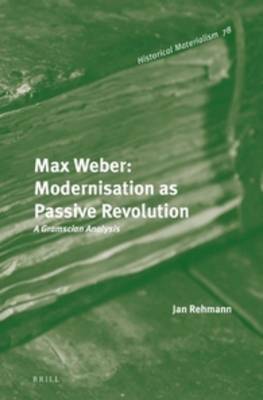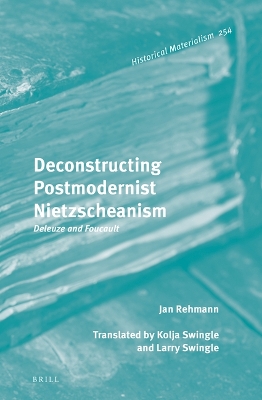Historical Materialism Book
3 primary works
Book 54
How to explain the hegemonic stability of neoliberal capitalism even in the midst of its crises? The emergence of ideology theories marked a re-foundation of Marxist research into the functioning of alienation and subjection. Going beyond traditional concepts of 'manipulation' and 'false consciousness', they turned to the material existence of hegemonic apparatuses and focused on the mostly unconscious effects of ideological practices, rituals and discourses. Jan Rehmann reconstructs the different strands of ideology theories ranging from Marx to Adorno/Horkheimer, from Lenin to Gramsci, from Althusser to Stuart Hall, from Bourdieu to W.F. Haug, from Foucault to Butler. He compares them in a way that a genuine dialogue becomes possible and applies the different methods to the 'market totalitarianism' of today's high-tech-capitalism.
Book 78
Basing his research on Gramsci's theory of hegemony, Rehmann provides a comprehensive socio-analysis of Max Weber's political and intellectual position in the ideological network of his time. Max Weber: Modernisation as Passive Revolution shows that, even though Weber presents his science as 'value-free', he is best understood as an organic intellectual of the bourgeoisie, who has the mission of providing his class with an intense ethico-political education. Viewed as a whole, his writings present a new model for bourgeois hegemony in the transition to 'Fordism'. Weber is both a sharp critic of a 'passive revolution' in Germany tying the bourgeois class to the interests of the agrarian class, and a proponent of a more modern version of passive revolution, which would foreclose a socialist revolution by the construction of an industrial bloc consisting of the bourgeoisie and labour aristocracy.
(c) 1998 Argument Verlag GmbH, Hamburg. Translated from German "Max Weber: Modernisierung als passive Revolution. Kontextstudien zu Politik Philosophie und Religion im UEbergang zum Fordismus".
(c) 1998 Argument Verlag GmbH, Hamburg. Translated from German "Max Weber: Modernisierung als passive Revolution. Kontextstudien zu Politik Philosophie und Religion im UEbergang zum Fordismus".
Book 254
Deconstructing Postmodernist Nietzscheanism: Deleuze and Foucault
by Jan Rehmann
Published 1 April 2022
It is often asserted that postmodernism emerged from 'leftist' Nietzsche-interpretations, but it is rarely explored. This book investigates how Deleuze and Foucault read Nietzsche and apply a hermeneutics of innocence to his philosophy that erases the elitist, anti-democratic, and anti-socialist dimensions. This misreading also affects their own theory and impairs the claim to develop a radical critique. The late Foucault’s turn to self-care techniques merges a neo-Nietzschean approach with the ideologies of neoliberalism. Rehmann’s critique is not directed against the endeavor to take suggestions from some of Nietzsche’s astute intuitions, but rather against the conformism to use him as a symbolic capital without revealing his hierarchical obsession.
This book is an updated and extended version of Postmoderner Links-Nietzscheanismus: Deleuze & Foucault. Eine Dekonstruktion, originally published in German by Argument Verlag GmbH, 2004, 978-3-88619-298-4.
This book is an updated and extended version of Postmoderner Links-Nietzscheanismus: Deleuze & Foucault. Eine Dekonstruktion, originally published in German by Argument Verlag GmbH, 2004, 978-3-88619-298-4.


